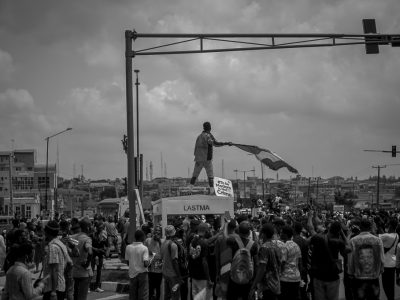
Protesters at the endSARS protest in Lagos, Nigeria. Photo by Kaizenify via Wikimedia (CC-BY-SA 4.0)
The Special Anti-Robbery Squad (SARS), a specialized unit of the Nigerian police, was created in 1992 to fight the escalating crime rate in African’s most populous nation.
However, SARS soon went rogue, gaining notoriety for their impunity and flagrant violation of human rights of Nigerian citizens. A 2016 report by Amnesty International described SARS as a “police squad operating outside the law” that has turned torture into “a means of extracting confessions and lucrative bribes.”
The movement to end SARS was born in 2017 from the hashtag #EndSARS, which trended on Twitter and was employed by netizens to track SARS abuses.
The #EndSARS offline protests started on October 3, 2020, when a video of SARS members brutalizing a young man in a Lagos hotel went viral. As of October 9, the hashtag #EndSARS had racked up 2.4 million tweets and was the number one Twitter trending topic in several countries.
Since then, Nigerian youth have risen up en masse to wage war against police brutality.
#EndSARS protests have sprung up in at least 12 of Nigeria’s 36 states, including Abuja, the federal capital, and Lagos. Protests also took place in many Nigerian diaspora communities.
The protagonists of this protest are Nigerian youth, often the victims of SARS intimidation, harassment and torture. They have built a peaceful, organic, decentralized, nonpartisan mass action on social media and through street protests that cuts across ethnic and religious lines.
Global Voices’ correspondents in Nigeria, Nwachukwu Egbunike and Aremu Adeola, Jr., have covered this youth movement from its inception.
مقالات معلومات عن مظاهرات EndSARS# في نيجيريا ضد بطش الشرطة
الجيش النيجيري يطلق النار على متظاهرين سلميين في لاغوس
رجال الأمن يطلقون النار على المتظاهرين عند بوابة ليكي، لاغوس، حيث لقى ثلاثة أشخاص مصرعهم. وقالت جماعات من المجتمع المدني أن الحكومة أعلنت الحرب على المدنيين.

